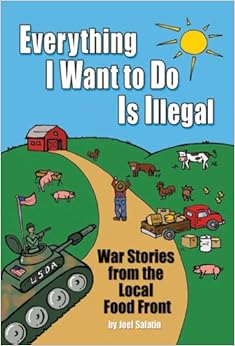Here's an eye-opening book about our nation's food system, written by a small-time farmer. I'd known a little about some of the problems with food production in our country, but Salatin provides an in-depth perspective from the point of view of the small farm community. Why have all our family farms disappeared? Could it be that regulation has made anything except large, corporate farms nearly impossible to manage at a profit? Could it be that corporations collude with government officials when new regulations are enacted? Could it be that government policies often have the exact opposite effect than what's intended?
Take, for example, the practice of zoning. To zone land as agriculture often means that (1) one can't process meat on one's own site (beyond that, what can be processed often involves so much government-mandated equipment that a small farmer couldn't possible do it legally); (2) one can't open a store on one's own site to sell the products from one's farm; and (3) one can't charge tourists for the pleasure of visiting one's farm. There are subtleties in each of these sets of laws. Salatin, for example, can process chicken but not beef, but only his own chicken. Salatin can sell food at the farm but only his own farm's food--and nothing that has been "processed" (forget those cookies). But there are good reasons for zoning--most of those stemming to corporate culture. I mean, who really wants to live by a huge chicken processing plant?
Salatin's point is that he's not a corporation and thus shouldn't be subject to the same sets of laws. There's a libretarian streak in Salatin's writings, a desire to do away with government as much as possible. I understand Salatin's points, and too a large extent I would tend to agree. Many regulations are nonsense. However, I'm not one for removing regulations in general. There's a balance here. Regulations that don't work should be rewritten (but often aren't because they advantage certain power players). And regulations in general need to be slated for the kind of farm one is running. Small producers shouldn't have to follow the same rules as large ones. Given the scale of production some of the health issues involved just aren't the same. But removing regulations in general doesn't seem a wise move to me. After all, laws are written to protect people, to offer guidance, and if such things don't exist, you end up with the kind of muddle our financial system is now in. Scale matters. If you have to stare your customer in the eye after selling him or her bad beef, you may not be so likely to do so, as compared to a big company to whom each customer is just a number. But at the same time, many of the banks that have failed in this most recent crisis are small ones. Had there been more guidance--albeit guidance scaled appropriately--perhaps troubles at all levels would have been averted.
Has Salatin changed my eating habits? Many of those had already changed after reading Fast Food Nation. Salatin simply added to my knowledge base. Were only good food more widely available.
Saturday, September 26, 2009
On "Everything I Want to Do Is Illegal" by Joel Salatin ***
Labels:
Books,
Joel Salatin,
Nonfiction,
Three-Star Nonfiction
Subscribe to:
Post Comments (Atom)







No comments:
Post a Comment